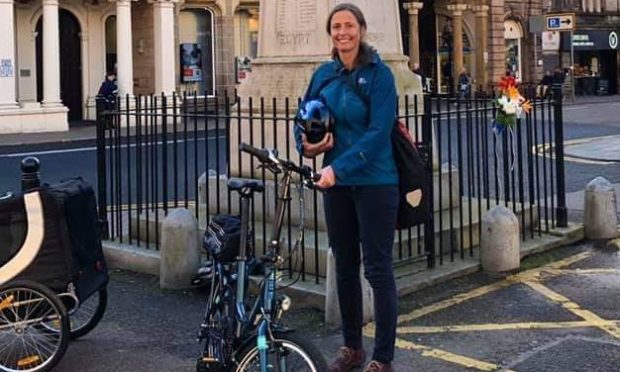A group of Highland health professionals has warned planners not to squander a “once in a generation” opportunity to make town centres safer for walkers, cyclists and wheelchair users.
It said there is a double incentive to retain some of the Spaces of People measures brought in during the pandemic to help both people’s health and the climate.
The group compares campaigning about the health and climate emergencies to past action by doctors who spoke out against smoking.
More than 130 GPs, nurses, pharmacists and others signed a letter circulated by Highland Healthcare Professionals for Climate Action to councillors.
It warns that removing infrastructure providing more space for pedestrians, cyclists and wheelchair users after lockdown ends would be a “retrograde and short-sighted action”.
The group said as well as reducing carbon emissions, the benefits of getting people out of cars include reducing obesity, diabetes, and respiratory disease and improving mental health.
It welcomed Highland Council Inverness Committee’s decision this month to develop proposals for a comprehensive transport strategy in the city. Councillors have also previously pushed for temporary changes to go further.
Group member, Inverness GP Dr Katie Walter, said: “There is growing interest in sustainability issues among health professionals and a debate going on about us becoming more active and using our voice.
“The Spaces for People measures are not ideal and there are issues with them but you have to start somewhere. A knee-jerk reaction would be to go back to the way things were and we are increasingly realising we cannot do that.
“We’ve been handed a once in a generation opportunity to re-think how we do things. Do we want a city that is going to look like a 20th century city dominated by cars? Or do we want one where people can move around safely by bike, on foot, on scooters or wheelchairs in an environment that then becomes much more pleasant?
“If we go back to the way we were it’s a squandered opportunity and with the current climate emergency we just don’t have that luxury.
“Other health professionals are taking a similar stand. A comparison is from the 1950s and 60s when it became known to medical science that smoking was dangerous to health.
“We are witnessing something very similar at the moment, that a growing swell of people feel we need to do something to get people out of cars for everyday simple journeys and to make it normal to walk and cycle. To do that we need to make the city safe.”
Dr Walter wants to retain current segregated areas for cyclists and wider pavements in places like Academy Street, in the city centre.
“The desire is not to throw the baby out with the bath water. There is going to be tweaking and things need to change, but we have to start somewhere and build on that experience.”
Councillor Trish Robertson, who chair’s Highland Council’s economy and infrastructure committee, said centres must become more sustainable.
She said it must be made easier for people to walk and cycle to get away from a dependence on cars.
“It’s not easy but this is the time to try it. Keep what works and redesign anything that doesn’t to get a better way forward.”
